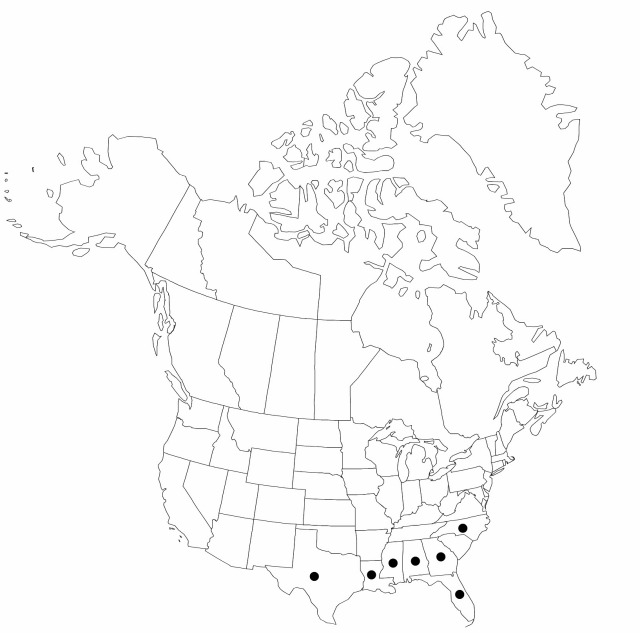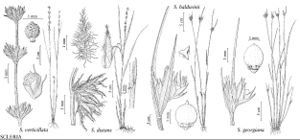Difference between revisions of "Scleria distans"
in J. Lamarck et al., Encycl. 7: 4. 1806.
FNA>Volume Importer |
FNA>Volume Importer |
||
| Line 26: | Line 26: | ||
|elevation=0–100 m | |elevation=0–100 m | ||
|distribution=Ala.;Fla.;Ga.;La.;Miss.;N.C.;Tex.;Mexico;West Indies (Cuba;Hispaniola;Jamaica);Central America;South America;Africa. | |distribution=Ala.;Fla.;Ga.;La.;Miss.;N.C.;Tex.;Mexico;West Indies (Cuba;Hispaniola;Jamaica);Central America;South America;Africa. | ||
| − | |discussion=<p>Scleria distans is widespread in tropical America and Africa. Temperate North American material has often been called Scleria hirtella Swartz (J. E. Fairey 1967; J. W. Kessler 1987); E. A. Robinson (1964) used the name S. nutans for those plants. The name S. hirtella properly belongs to an annual species of tropical America (C. D. Adams 1994b).</p> | + | |discussion=<p><i>Scleria distans</i> is widespread in tropical America and Africa. Temperate North American material has often been called <i>Scleria</i> hirtella Swartz (J. E. Fairey 1967; J. W. Kessler 1987); E. A. Robinson (1964) used the name <i>S. nutans</i> for those plants. The name S. hirtella properly belongs to an annual species of tropical America (C. D. Adams 1994b).</p> |
|tables= | |tables= | ||
|references= | |references= | ||
| Line 50: | Line 50: | ||
|publication year=1806 | |publication year=1806 | ||
|special status= | |special status= | ||
| − | |source xml=https://jpend@bitbucket.org/aafc-mbb/fna-data-curation.git/src/ | + | |source xml=https://jpend@bitbucket.org/aafc-mbb/fna-data-curation.git/src/8f726806613d60c220dc4493de13607dd3150896/coarse_grained_fna_xml/V23/V23_436.xml |
|genus=Scleria | |genus=Scleria | ||
|species=Scleria distans | |species=Scleria distans | ||
Revision as of 16:08, 18 September 2019
Plants perennial; rhizomes horizontal, elongate. Culms erect, slender, 15–65(–75) cm, hairy or glabrous. Leaves: sheaths green to brownish or reddish, not or scarcely winged, weakly ribbed, hirsute or glabrous; contra-ligule minute, obtuse, or absent; blades linear, ribbed, usually much shorter than inflorescences, 1.5–4(–5) mm wide, pubescent or more rarely glabrous. Inflorescences terminal, unbranched, glomerate-spicate, 4–8(–12) cm; glomerules 3–9(–11), inserted in longitudinal concavities in rachis, open, nodding or reflexed, greenish to reddish brown, 4–7 mm wide, each with 2–7(–8) spikelets; bract occasionally subtending proximalmost glomerule, attenuate, 1–2.5 cm. Spikelets bisexual and staminate, 4–5 mm; staminate spikelets many flowered; staminate scales lance-acuminate, pistillate scales ovate-acuminate. Achenes sordid white or gray, trigonous, ovoid to subglobose, 1–2 mm, smooth, shining, base broadly cuneate-attenuate, apex mucronate, hypogynium obsolete, represented by narrow brownish ridge or band at base of achene.
Phenology: Fruiting spring–fall.
Habitat: Moist sandy or sandy-peat soil in savannas, pinelands, or meadows, also in peaty bogs, seepage areas
Elevation: 0–100 m
Distribution

Ala., Fla., Ga., La., Miss., N.C., Tex., Mexico, West Indies (Cuba, Hispaniola, Jamaica), Central America, South America, Africa.
Discussion
Scleria distans is widespread in tropical America and Africa. Temperate North American material has often been called Scleria hirtella Swartz (J. E. Fairey 1967; J. W. Kessler 1987); E. A. Robinson (1964) used the name S. nutans for those plants. The name S. hirtella properly belongs to an annual species of tropical America (C. D. Adams 1994b).
Selected References
None.
